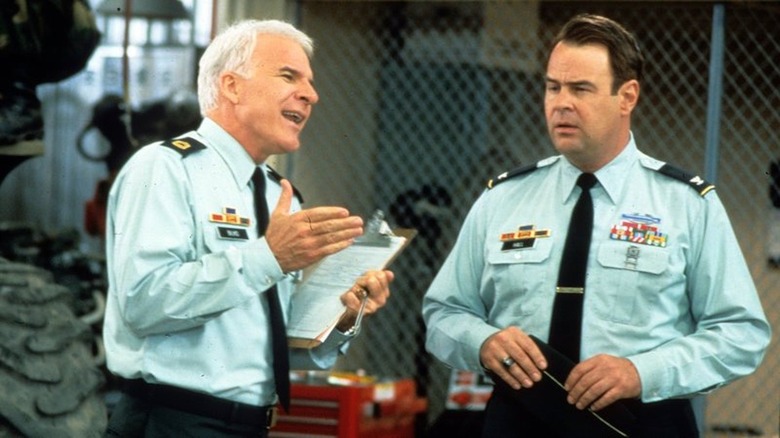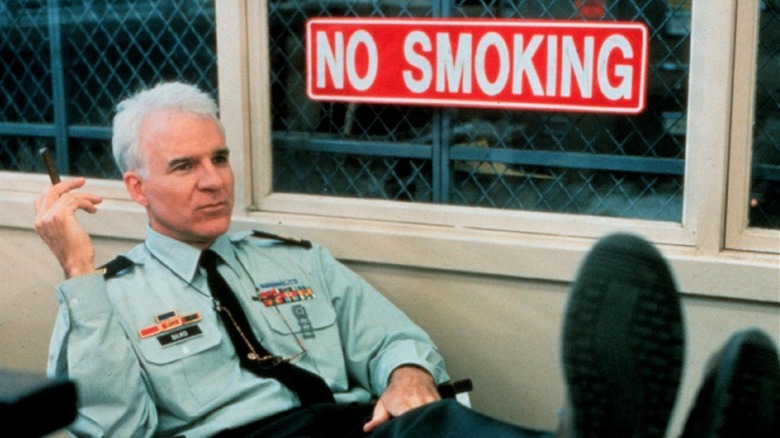Sgt. Bilko Made Steve Martin Rethink The Course Of His Comedy Career
Of the many TV-to-movie adaptations (a trend that kicked off in 1987 with "The Untouchables" and "Dragnet," and hit overdrive with the success of 1991's "The Addams Family"), the diciest propositions have always been the films based on series that were tailored to the personality of their stars. Dan Aykroyd made "Dragnet" work (until its lame action finale) because he was doing a dead-on, deadpan parody of Jack Webb's Sergeant Joe Friday, whereas the great Jim Varney struggled as Jed Clampett in 1993's "The Beverly Hillbillies" because, when it came to playing TV rednecks, he was too defined by his Ernest P. Worrell persona to approximate Buddy Ebsen's interpretation and/or add his own flourishes.
It gets dicier when you're adapting a show named after the actual star. Even if creator James L. Brooks went nutzoid and decided to revive "The Mary Tyler Moore" show starring Sydney Sweeney, there would be an audience of exactly zero for it. Fans of the show would be aghast at the notion of anyone trying to recapture the magic of one of the greatest network sitcoms to ever air.
I have no idea what Universal was thinking when they greenlit "Sgt. Bilko." For starters, the series the film rebooted, "The Phil Silvers Show," featured Silvers basically playing himself as the scheming Army officer who abuses his authority to get over on suckers. But if the studio was dead set on reviving the show, we can at least give them credit for casting the only comedic performer who could get in the ballpark with Silvers: Steve Martin.
There's only one Phil Silvers, and only one Steve Martin
Jonathan Lynn's "Sgt. Bilko" isn't as terrible as its reviews indicate. Gene Siskel and Roger Ebert were two of the only critics who got that it was an ephemeral goof designed to amuse in the moment and dissipate the second you left the theater. But while Martin's fine in the role, you can see him scuffling. It's a sweaty performance, primarily because he's trying to be Silvers. He admitted as much to The Independent in 1999:
"I didn't like this movie I did, 'Sgt. Bilko.' I didn't like what I was doing in it, I felt I was going downhill rather than uphill, so I wanted a break. It's not a bad movie, it's a nice movie for kids, but I felt I was somehow letting myself down. I was getting a little lost about what I wanted to do."
Martin's instincts were correct. His genius shouldn't be wasted on an impersonation of another genius. The film's failure forced Martin to reevaluate his career. He was already writing plays and humorous pieces for The New Yorker, but he further diversified to write a novella ("Shopgirl") and mined his distaste for showbiz with the screenplay for the utterly brilliant "Bowfinger." Why was he trying to be Phil Silvers when he was Steve Martin?
Having seen "Bringing Down the House," "Cheaper by the Dozen" and "The Pink Panther," I'm not sure the lesson stuck. His Peter Sellers imitation made his take on Silvers look like Aykroyd's Joe Friday. Fortunately, he recalibrated again, and now we have the sublime "Only Murders in the Building."

